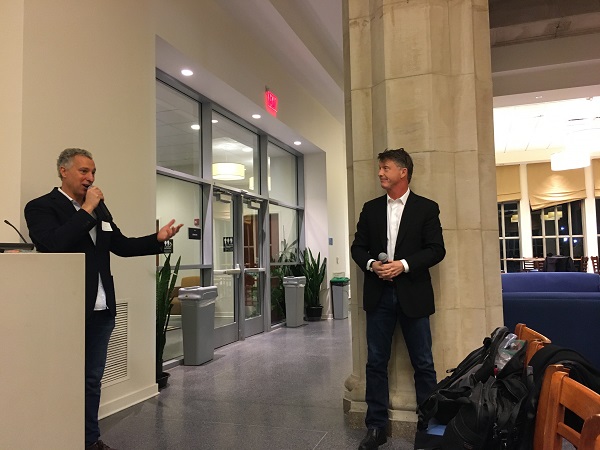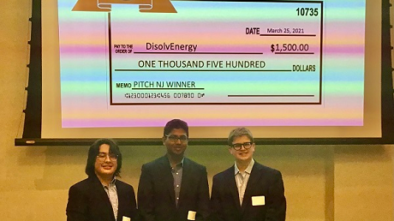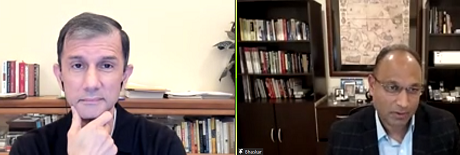Rick Miller Shows Morris Tech Meetup Members How to Increase their Entrepreneurial Power
When Rick Miller introduced his workshop at the Morris Tech Meetup on January 28, he told the group that they would leave with something they could use. He said he was a businessman, and “if I can’t use it, I don’t have time for it.”
Then he introduced the audience to a tool he created: “Power Compass.” It is about sustainable growth, he said, and about the choices that entrepreneurs make. As startups, you probably don’t have enough resources, he told the group, “so how can you optimize what you have to grow?”
Miller, whose consulting practice is called “Being Chief” (Morristown), spent over 30 years as a business leader and turnaround specialist, serving as president and/or CEO of Fortune 10, Fortune 30, nonprofit and startup companies. He now consults with CEOs and entrepreneurs across industries, and is the author of the book “Be Chief: It’s a Choice not a Title.”
What all enterprises have in common is culture, he said. “That’s an area where it doesn’t matter what industry your company is in. I don’t care if you have one person working for you or a thousand or 10,000.” The cultural discussion is always the same, he said.
Culture as the Key to Power and Growth
Culture is the key to power and growth, according to Miller. He acknowledged that many entrepreneurs don’t want to concentrate on the “soft stuff, the squishy stuff,” but he noted that the numbers back up his claims.
Miller then described research findings indicating that the companies that concentrated on culture did grow, but didn’t have nearly the bottom-line results of the companies that made culture a priority. He also cited some specific examples of companies he had helped that significantly sped up their growth after changing their corporate cultures.
John Carini, a Morris Tech Meetup organizer and founder and CEO of iEnterprises (Chatham), added that the definition of “power” is different for entrepreneurs. People normally think of power as authority, superiority, title and position, he said, but for entrepreneurs it’s about energy, pushing it forward, competence, clarity, influence and impact.
“Power in traditional companies is only held by a few, but with an appropriate culture, it spreads everywhere,” Carini said. He added that, as a startup entrepreneur you really must spread power, as the team is spread thin with outsourced employees and part timers. “This energy, this influence brings them into the fold,” he noted.
Researching How Feelings Spread
Miller then talked about the research that has been done on how feelings spread in any given situation. The findings have shown that, for example, if someone who has moved into a house next to yours is exceedingly happy, their happiness will spread to you and to the other next door neighbors, but also to their friends living within a mile, siblings living within a mile and so on. If you are their next-door neighbor, the “probability of you being exceedingly happy goes up by 34 percent.”
The same is true of employees in a company. If they are happy, happiness spreads, and so does productivity, loyalty to the company and growth.
The Power Compass
Prior to the meeting, the attendees had filled out the Power Compass questionnaire, on paper or online, which asked them to rate themselves from 0 to 4 on questions like, “Do I build specific approaches to succeed with the help of others,” “Do I trust my feelings as truth and guidance” and “Do I ‘walk the talk’ to demonstrate what I believe to others?” They were also asked to choose four values that they stand for and write them down.
Then, together with Carini, Miller demonstrated how improving their answers to these questions could give the entrepreneurs in the audience more power.
Insight was the first area that Miller covered. He mentioned the theory that if you increase your insight, you increase your energy. The first point made in this regard was about living in the moment, being “present.” For example, entrepreneurs who are present can catch the body language of teammates who are not aligned with each other.
When you are an entrepreneur, “you have to pick up as many signals as you can,” he said. You can’t afford to miss them because you’ve got so little time and you have to optimize it. “If you focus on what’s happening right now — not where you will be tomorrow, not what’s going to happen next week, not where you’ve been all day — how much can you get out of each moment?” he asked.
Carini, who had been working with Miller, showed his own scores on the insight question and on all the other questions the group had answered. He noted that he really had trouble focusing sometimes, and would make excuses that he’s had a lot of things coming at him, like most entrepreneurs. But he knew that he needed to focus more, in order to project more energy.
The workshop continued, with Miller going over all the areas on the Power Compass, and Carini discussing his answers. Many of the entrepreneurs in the room were energized by the exercise, and afterward several told NJTechWeekly.com that they had found it extremely valuable




